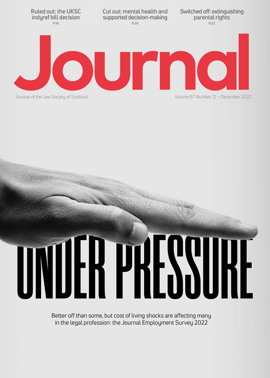Opinion: Jen Shipley
 Emotion and law. I used to think that these words were mutually exclusive, but now it is abundantly clear to me that they are intrinsically linked.
Emotion and law. I used to think that these words were mutually exclusive, but now it is abundantly clear to me that they are intrinsically linked.
I have always been a sensitive person. I wear my heart on my sleeve and I find myself tearing up, at times involuntarily, when I’m emotionally impacted by something, good or bad.
Throughout my life, but particularly when I was considering entering the legal profession, people who didn’t know me made off the cuff remarks that I’m too sensitive and that I need to toughen up so that things don’t affect me as much. I like to think they meant well and were coming from a good place, but over time their comments really knocked my confidence. I started to perceive my sensitivity as weakness. I found myself asking, “Am I really cut out for a career in law?”
Early in my career, a somewhat brief experience of working as a paralegal almost put me off being a lawyer entirely. To say I was thrown in the deep end is an understatement. I was working in a very challenging area of law with no proper training or guidance. I cried every day, but tried to convince myself that things would get better.
Part of my role entailed visiting clients all over the country. On one occasion the traffic was terrible, and I ended up missing a client appointment. I was so worried about having to face my boss to tell them, that it culminated in me suffering a panic attack on a busy A road and having to be taken by ambulance to hospital. I was later told that after hearing what had happened, my boss had said words to the effect that I clearly wasn’t cut out to be a lawyer.
I left shortly after, my confidence shattered. I returned to my role in retail, convinced that I wouldn’t be a lawyer. Thankfully, after a few months, I realised that I could not let one bad experience shape my career. I applied for a paralegal role at my current firm, which thankfully embraces and supports my emotions, and I will shortly be celebrating my 10-year anniversary.
Even after I left the previous firm, I realised that my scars remained. The comments made resonated with me, and when I started at my current firm, initially I tried to mask my emotions for fear I would appear weak. After all, lawyers shouldn’t be emotional, should they? I quickly came to realise that being in touch with my emotions is not weakness; it is in fact my greatest strength and it makes me a much better lawyer.
Our clients want to be represented by humans as lawyers, not robots. The best lawyers are not only technically brilliant but have other subtler skills, including emotional awareness and empathy, that are just as important, if not more so, and set them apart from the rest.
Being an emotionally intelligent lawyer is an asset that should be celebrated. I can establish strong relationships with my clients built on a foundation of mutual respect and trust. They appreciate my ability to empathise with them and emotionally invest in their case, and in turn they open up to me which enables me to obtain very detailed witness evidence that might be missed without our developing that rapport. Defendants’ solicitors have commented that the level of detail in my witness statements enabled them to really understand the nature and extent of the client’s injury, which in turn facilitated settlement.
I regularly cry when taking witness statements from my clients, many of whom have suffered lifechanging injuries and are going through the most difficult time of their life. I have attended their weddings and funerals, and felt incredibly touched and privileged that they would want me there at such important and personal events.
This belies the perception that lawyers need to be cold and ruthless to be successful. Being tough does not denote strength. In my area of law, litigation, I’ve heard it said that those who shout the loudest and are the most aggressive are often coming from the weakest position.
Being a lawyer in touch with their emotions is not weakness; it’s the definition of strength. A word of warning though: while showing our emotions should be embraced, it can take its toll on us mentally, and we need to ensure that we put boundaries in place to look after our mental health to avoid burnout. As lawyers, we need to look after ourselves to ensure that we can look after our clients and represent them to the best of our ability.
A final message to legal employers. Please don’t try and suppress the emotions of your staff; instead embrace, celebrate, and support them to channel their emotions for the benefit of their clients and your business.
Perspectives
Features
Briefings
- Criminal court: Farewell retrospective
- Agriculture: A future support framework
- Corporate: Is there a creditor duty?
- Intellectual property: "Reclaiming the UK statute book"
- Sport: Flouting their own rules?
- Succession: Crofting tenancy transfers in intestacy
- Scottish Solicitors' Discipline Tribunal: December 2022
- Property: Conveyancing – the future is in our hands
- In-house: With a fair wind







